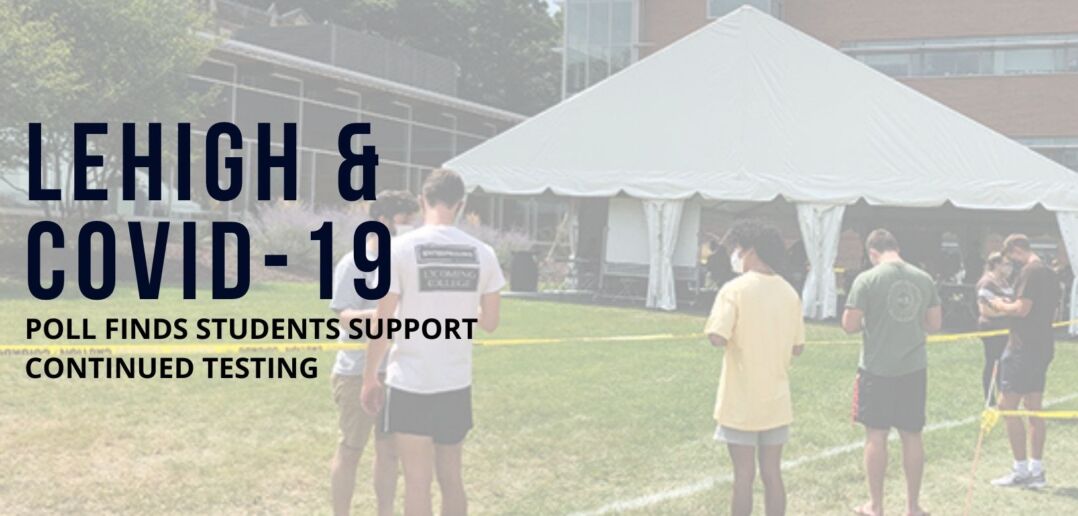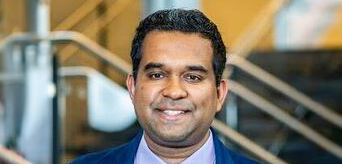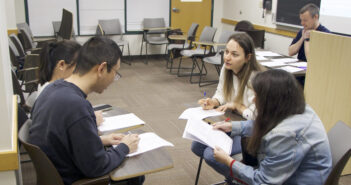Noa Worob, a senior at Vanderbilt University, described a scene of long rows of COVID-19 testing stations spread out over a large field at the Nashville, Tennessee, school.
Every Wednesday at 1 p.m., Worob — donning her mask — makes the trek to that field. Every Vanderbilt student who is not “fully remote” signs up for a weekly time slot that the student follows for the entire semester, regardless of symptoms, according to an Aug. 31 email from Provost Susan Wente to the Vanderbilt community.
Every Wednesday at 1 p.m., Worob is given a COVID-19 saliva test.
“It kind of feels like you’re in a sci-fi movie,” Worob said of the scene. “Like, ‘Oh, this can’t be real.’”
But Worob’s experience at Vanderbilt during a pandemic stands in stark contrast to the testing plan put forth by Lehigh University for its students.
Vanderbilt follows a testing schedule defined as surveillance testing, which is the process of testing large groups of individuals, regardless of symptoms, to closely monitor potential exposure.
All Lehigh students living on-campus, and those who are off-campus but did not elect the fully remote option — and thus have access to campus facilities — had to undergo surveillance testing once per week during the first two weeks of the semester. On-campus students also had to present a negative test result before accessing Lehigh’s campus.
Fully remote students, including those living in South Bethlehem, did not have to get tested at any point. About 30 percent of Lehigh students chose the fully remote option and therefore did not get tested by the university — although not all fully remote students are in South Bethlehem this fall.
Now, after Lehigh’s initial round of testing, no additional mandatory surveillance testing is planned at this time.
Only students with symptoms are able to be tested by Lehigh’s Health and Wellness Center for the rest of the semester, as the plan currently stands. Fully remote students with symptoms can get tested, too.
That’s not sitting well with many students.
A recent Brown and White survey conducted via an Instagram poll between Sept. 20 and Sept. 21 found that an overwhelming majority of respondents would like to continue routine weekly surveillance testing, regardless of symptoms. Out of 522 respondents, 484 — or 92.72 percent — said they are in favor of returning to routine weekly testing.
Lehigh is reporting zero on-campus coronavirus cases and seven positive off-campus cases as of Sept. 21.
“The message being sent across is that Lehigh is doing really well with COVID,” said Zoe Madsen, ‘22. “Of course we look good. If we are doing zero tests, then there will be zero positive cases. It’s not right to report that there are zero cases if we haven’t been tested.”
Dave Jha, ‘22, echoed Madsen’s concerns.
“It feels like the dashboard isn’t really relevant anymore,” he said.
And Madsen points out it’s not just about students, who generally have a much higher rate of recovery and survival after contracting the coronavirus compared to other age groups and populations.
She said it’s also important to protect those most vulnerable who might be on campus.
“If we’re not being tested and we’re still going into classes, it seems unfair to put our professors in a situation where they’re stuck in a room with us not knowing if we’ve been tested or not,” she said. “That makes me feel really awful for them, and it feels like an unfair position to put them in as well.”
David Rubenstein, the executive director of Lehigh’s Health Center, said the symptomatic testing, contact tracing efforts and mitigation protocols, like mandatory mask wearing and social distancing, are “in line with best practices and follows guidance from the CDC.”
Rubenstein said the university is reviewing its testing approach “on an ongoing basis.”
“Action will be determined by case numbers among the student population and in the region as well as recommendations from CDC and regional public health authorities,” he said in an email.
A study published by researchers at Harvard and Yale universities, however, concluded that a safe way to bring students back to campuses this fall would be to test for COVID-19 every two days.
The proposed method includes the use of rapid tests on a frequent basis. The rapid tests, which have proven to have higher rates of inaccuracies, are more cost effective, the study said. The frequent, high volume testing would allow for heightened monitoring of exposure while simultaneously shrinking the window for inaccuracies and minimizing cost.
The study also recognized that such high volume testing is not fiscally or logistically feasible for many universities.
“This is an exceptionally high bar, and it may well be beyond the capacity of many schools,” wrote A. David Paltiel, the study’s lead author and a professor of public health at Yale School of Medicine.
When asked if cost was a factor in Lehigh’s plan to only conduct surveillance testing the first two weeks of the semester, Lori Friedman, Lehigh’s director of media relations, said advice from public health authorities “guided and continue to guide” the school’s testing plan.
The Brown and White spoke with students who attend Cornell University, Tulane University, Vanderbilt University, Bucknell University and Moravian College to better understand how other schools of various types and sizes are conducting coronavirus testing on their respective campuses.
As it currently stands, several other students interviewed by The Brown and White are being tested more frequently throughout the semester compared to Lehigh.
At Cornell University in Ithaca, New York, students are tested once or twice a week as part of their surveillance testing program.
“This program is meant to survey large numbers of the community each day to identify asymptomatic individuals before they can spread the virus,” said Provost Michael Kotlikoff, Vice Provost Gary Koretzky and Dean Lorin Warnick in an Aug. 4 message sent to the Cornell community.
Sam Seltzer, a junior at Cornell, said he has had around 10 coronavirus tests administered by the school since he returned to Ithaca on Aug. 20.
Seltzer said he is tested twice a week by the university. Cornell has students conducting a “self-swab test,” where they stick a swab up each nostril for 10 seconds, he said.
“I would feel scared if we are not all getting tested two to three times a week and we are all ensuring that we are negative all the time,” Seltzer said. “I definitely wouldn’t feel comfortable.”
Sarah Morgan, a junior at Bucknell University, said students are being tested every 10 to 14 days in the on-campus athletic center.
Morgan said she feels safe on campus knowing that students are being tested and that the university is able to catch potential outbreaks quicker.
“I personally like knowing for myself that I’m not putting anyone at risk,” Morgan said. “It’s nice to know that the school is checking up on us and also making sure we are socially responsible with the community around us. I don’t know if I would feel safe if they stopped (testing students).”
In a Sept. 17 email shared with The Brown and White, Bucknell Dean Amy Badal shared an updated testing plan with the campus.
“In order to quickly identify positive cases of COVID-19 and maintain a safe campus, Bucknell has contracted with Genetworx to test every student, faculty and staff member on campus approximately every 10 to 14 days,” Badal wrote. “This provides students with eight tests spaced evenly throughout the semester.”
Mike Ferlazzo, director of media relations at Bucknell, spoke with The Brown and White about Bucknell’s testing strategy.
At the start of the academic year, 3,724 students were enrolled in Bucknell with 3,386 returning to campus. The remaining 338 chose to take classes remotely during the fall semester, he said. Bucknell students who returned to campus participate in a hybrid system of classes.
Bucknell currently has three active COVID-19 cases and has had 18 on-campus positives (14 students, four employees) as of Sept. 21.
“We want to ensure the health and safety of our campus community, and one of the best ways to find out where we are right now with this pandemic is to find out how many instances of COVID we have,” Ferlazzo said. “The best way to contain it is to also quarantine and isolate students where there might have been a positive COVID test.”
Bucknell has isolation housing where students must isolate for 10 days after receiving their positive result.
Ferlazzo said Catherine O’Neill, Bucknell’s medical director, and President John Bravman led a team of faculty and staff who developed Bucknell’s campus testing plan. He said this testing strategy was the best decision for Bucknell from a health and safety standpoint.
Bucknell required students to have two negative tests before they returned to campus at the beginning of the academic year.
“You try and make the campus community as COVID-free as possible, and the best way to find that out is through testing and really trying to keep (COVID from) spreading throughout the course of the semester,” Ferlazzo said.
According to the Tulane Hullabaloo, Tulane University’s student newspaper, the New Orleans-based school is also testing its students throughout the semester.
On-campus undergraduate students are tested twice a week, and off-campus undergraduate students are tested once a week.
“At first, we were going to get tested once a month, but that wasn’t sustainable,” said Kate Stackel, a sophomore at Tulane. “After being here, (Tulane) changed (how often students receive COVID-19 tests) to once a week, and then after another week or two, they changed it to twice a week (for on-campus students).”
Stackel just finished a 14-day quarantine after one of her friends tested positive for COVID-19.
Her friend, who was asymptomatic at the date of her test, found out she was positive through Tulane’s testing. Stackel said it was good the students received testing, as it limited her friend from potentially spreading the virus to others.
Stackel said she would be nervous if Tulane stopped testing students.
Back in Bethlehem, though, Samantha Cherenson, a junior at Moravian College living on-campus, said Moravian is only testing symptomatic students, similar to Lehigh’s plan.
Moravian’s testing strategy worries Cherenson.
“I feel somewhat concerned about it, because obviously then I don’t know what’s going on here,” Cherenson said. “I’m also an athlete, so the fact that I’m interacting with a bunch of people more than anybody else is is a little concerning. I was under the impression they were going to test athletes, but they have not yet.”
Two women on Cherenson’s lacrosse team are immunocompromised, so she said the team has been taking the proper precautions during their practices, including wearing masks to keep everyone as safe as possible.
Cherenson said she wishes she was tested once a week or once every two weeks for coronavirus.
On Lehigh’s campus, Ava Florczak, ‘23, shared a similar sentiment.
“The pandemic has just shown all of the pitfalls of Lehigh and the administration.”
-Ava Florczak, ’23
“I’m not too happy with how they’re handling it, especially because they’re only testing people who didn’t pick the fully remote option,” she said.
Florczak said her initial fears stemmed from on-campus students who were consistently interacting with the remote, off-campus students who were not required to be tested at any point.
“I just feel like that’s irresponsible and doesn’t really keep people safe,” Florczak said. “If they want people to stay here and to feel like the school cares about them, then they should test people.”
Jha, who is living in SouthSide Commons near Lehigh’s campus, said he has conflicting feelings toward the school’s testing protocols.
“There are certain parts that I do feel comfortable with and some that I don’t feel comfortable with,” he said. “The testing strategy is not very good at all. I was excited they were testing everybody the first two weeks, but the follow up to that is important, too.”
While his classes are entirely online, Jha is a non-remote student which grants him access to campus facilities like Zoellner Arts Center where Jha likes to play music.
Madsen, a Lehigh earth and environmental sciences major, attends in-person labs and classes. While she is living with people who are “safe and responsible,” Madsen said students can only do so much and that the school has a responsibility to do more testing to help stop the spread.
“I don’t think you can really, clearly stop people from being dumb if they’re doing it from behind closed doors,” she said.
Madsen said if students were continuously getting tested, she would feel much safer. And she acknowledged Lehigh doesn’t exist in a bubble.
“It’s also about the Bethlehem community,” Madsen said. “We’re coming into a community that doesn’t belong to us, and we’re not getting tested.”
Jha, who’s uncle is the dean of Brown University’s School of Public Health, said after conversations with his uncle and comparing Brown’s testing plan to Lehigh’s, he’s growing increasingly worried about Lehigh’s approach to testing.
He would like to see randomized student testing executed at Lehigh.
“Now we’re in a place where we don’t really understand the growth of the virus since we’re not testing unless they’re symptomatic,” Jha said. “And we know kids out there, especially our age group, are spreading more asymptomatically than symptomatically. It seems the university is ignoring that part of the conversation, that the virus exists in an asymptomatic manner.”
Florczak, though, was more blunt in her assessment of the school’s handling of COVID-19.
“The pandemic,” she said, “has just shown all of the pitfalls of Lehigh and the administration.”







Comment policy
Comments posted to The Brown and White website are reviewed by a moderator before being approved. Incendiary speech or harassing language, including comments targeted at individuals, may be deemed unacceptable and not published. Spam and other soliciting will also be declined.
The Brown and White also reserves the right to not publish entirely anonymous comments.
4 Comments
“When asked if cost was a factor in Lehigh’s plan to only conduct surveillance testing the first two weeks of the semester, Lori Friedman, Lehigh’s director of media relations, said advice from public health authorities “guided and continue to guide” the school’s testing plan.” It’s the economy stupid, cost is always a factor.
David Rubenstein, the executive director of Lehigh’s Health Center, said the symptomatic testing, contact tracing efforts and mitigation protocols, like mandatory mask wearing and social distancing, are “in line with best practices and follows guidance from the CDC.” Plausible deniability.
Randomized student testing at Lehigh, probably a good option. In the meantime students: “Let’s be careful out there.”.
It’s shameful how little help Lehigh has been giving students. Whether it’s penny-pinching or trying to make the school look better, it’s harmful for the Lehigh and the South Bethlehem communities.
Lehigh is doing the right thing as students are not impacted by this virus as zero college students in the entire state of Pa has been hospitalized yet from COViD.
Neither has any NFL or MLB player been hospitalized. Patriot League should be playing football every Saturday in Goodman Stadium with fans enjoying the experience.
Half of you won’t even know you had COVID so relax as the seasonal flu is more dangerous for young people.
Good, let’s send a silently-COVID-infected student to your house to have dinner with you and see if you still think it’s a good idea for the kids to get COVID. Since 1 in 5 people under 25 who get COVID take weeks to recover, and a majority have organ-involvement sequelae for weeks (could be longer, we won’t know for a while), I take it we can also send their followup medical bills to you, and you’ll make good their lost pay, courses they have to re-take, etc.